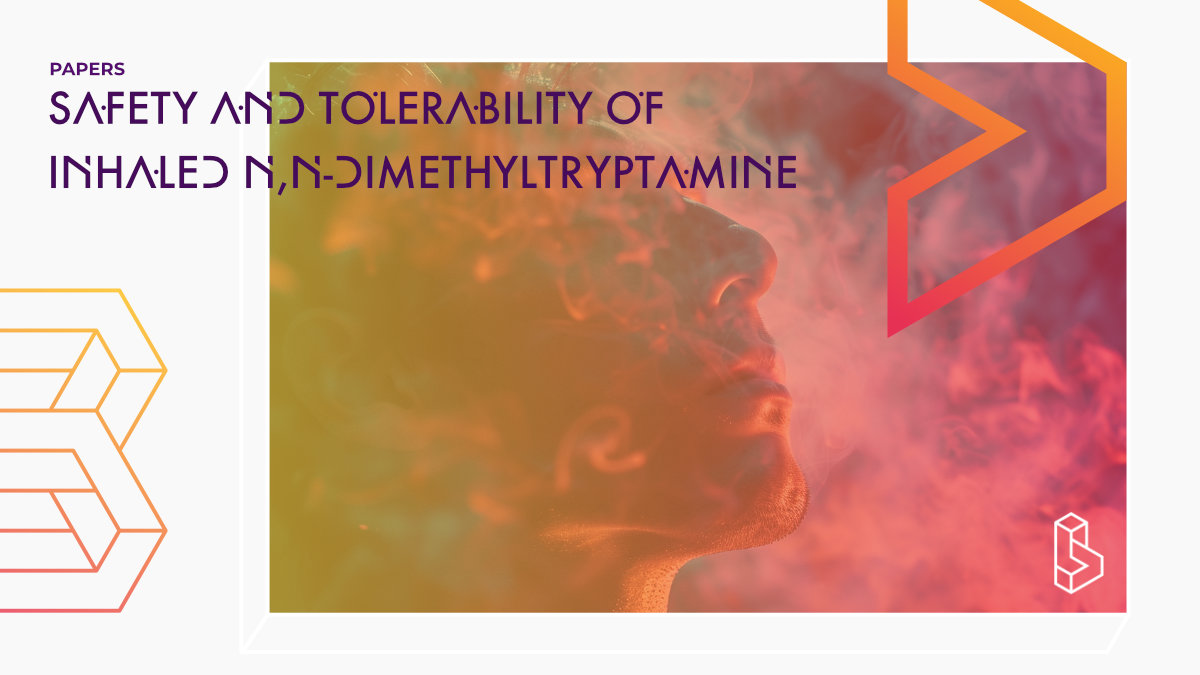This open-label, single-ascending, fixed-order dose-response study (n=27) investigates the safety and tolerability of inhaled DMT. The healthy volunteers received varying doses of inhaled DMT (5-60mg). Preliminary findings indicate dose-dependent increases in intensity, valence, and perceptual ratings, with no significant safety concerns, suggesting inhaled DMT as a potentially efficient and safe administration method.
Abstract of Safety and tolerability of inhaled N,N-Dimethyltryptamine
“Psychedelics are being increasingly examined for their therapeutic potential in mood disorders. While the acute effects of ayahuasca, psilocybin, and lysergic acid diethylamide (LSD) last over several hours, inhaled N,N-Dimethyltryptamine (DMT) effects last around 10 min, which might provide a cost- and time-effective alternative to the clinical application of oral psychedelics. We aimed at investigating the safety and tolerability of inhaled DMT (BMND01 candidate). We recruited 27 healthy volunteers to receive a first, lower dose and a second, higher dose (5/20 mg, 7.5/30 mg, 10/40 mg, 12.5/50 mg, or 15/60 mg) of inhaled DMT in an open-label, single-ascending, fixed-order, dose-response study design. We investigated subjective experiences (intensity, valence, and phenomenology), physiological effects (blood pressure, heart rate, respiratory rate, blood oxygen saturation, body temperature), biochemical markers (liver, kidney, and metabolic functions), and adverse events during the acute and post-acute effects of DMT. DMT dose-dependently increased intensity, valence and perceptual ratings. There was a mild, transient, and self-limited increase in blood pressure and heart rate. There were no changes in safety blood biomarkers and no serious adverse events. DMT dose-dependently enhanced subjective experiences and positive valence. Inhaled DMT might be an efficient, non-invasive, safe route of administration, which might simplify the clinical use of this substance. This is the first clinical trial to test the effects of inhaled DMT (BMND01 candidate).”
Authors: Marcelo Falchi-Carvalho, Isabel Wießner, Sérgio Ruschi B. Silva, Lucas O. Maia, Handersson Barros, Sophie Laborde, Flávia Arichelle, Sam Tullman, Natan Silva-Costa, Aline Assunção, Raissa Almeida, Érica J. Pantrigo, Raynara Bolcont, José Victor Costa-Macedo, Emerson Arcoverde, Nicole Galvão-Coelho, Draulio B. Araujo & Fernanda Palhano-Fontes
Summary of Safety and tolerability of inhaled N,N-Dimethyltryptamine
Ayahuasca, N,N-dimethyltryptamine (DMT), and psilocybin are among the few new compounds with promising evidence of rapid antidepressant effects in patients with Treatment-Resistant Depression (TRD). The acute psychedelic effects of these substances last over several hours and require multiple dosing sessions with two therapists.
DMT is an indole alkaloid endogenously found in different plants, fungi, animals, and humans. It is an agonist of diverse neuroreceptors, including serotonin 2A, 2C, and 1A, sigma-1, and Trace Amine-Associated Receptors (TAAR).
The first DMT study in humans was conducted in 1956. It showed that DMT induces transient changes in blood pressure and heart rate and changes in consciousness, imagery, body distortions, auditory perception, cognition, mood, arousal, and entity encounters.
Find this paper
https://doi.org/10.1016/j.euroneuro.2023.12.006
Paywall | Google Scholar | Backup | 🕊
Cite this paper (APA)
Falchi-Carvalho, M., Wießner, I., Silva, S. R. B., Maia, L. O., Barros, H., Laborde, S., ... & Palhano-Fontes, F. (2024). Safety and tolerability of inhaled N, N-Dimethyltryptamine (BMND01 candidate): A phase I clinical trial. European Neuropsychopharmacology, 80, 27-35.
Study details
Compounds studied
DMT
Topics studied
Safety
Healthy Subjects
Study characteristics
Original
Open-Label
Within-Subject
Participants
27
Humans
Compound Details
The psychedelics given at which dose and how many times
DMT 5 - 60mg | 2x
Linked Research Papers
Notable research papers that build on or are influenced by this paper
The antidepressant effects of vaporized N,N-Dimethyltryptamine: a preliminary report in treatment-resistant depressionThis open-label Phase IIa clinical trial (n=6) examines the efficacy of vaporized DMT in treating treatment-resistant depression (TRD). Patients experienced significant reductions in two depression scores (MADRS & PHQ-9), with 83% responding to treatment by day 7 and 66.67% achieving remission. The rapid onset and sustained antidepressant effects of vaporized DMT suggest its potential as a practical and accessible option in psychedelic treatments for depression within interventional psychiatry.
Linked Clinical Trial
Clinical Study of DMT in Healthy AdultsThis open-label trial (n=30) seeks to evaluate the acute and subacute effects of inhaled DMT. Participants will be given a low dose (7mg/70kg) and then two hours later a higher dose (49mg/70kg). Participants will not receive psychological support.

